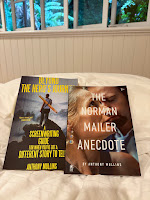Has being a writer changed the way you read? What are you reading now?
Current read: The Bluff by Joanna Jenkins. Previous read: The God of the Woods by Liz Moore.
I read more crime novels now that I've been published as a crime fiction writer. Before I wrote crime, I used to read mainly literary fiction. But I always liked scary movies, especially dark psychological thrillers. My favourite movie as a kid was the Freddy Krueger series: a monster who appears in your dreams and kills you while you’re asleep is so perfectly, deliciously, terribly awful.
The turning point for me as a reader was when I was writing
my debut novel, Bay of Fires. My mentor at the time, author Venero Armanno, observed that everything interesting in my manuscript revolved around one mysterious death. He
suggested I read one of Garry Disher's well-crafted crime novels. I did,
and I was hooked on the genre.
I've just finished reading Liz Moore’s excellent
mystery novel The God of the Woods. I especially liked the nostalgia of the
1950s, 60s and 70s, the portrayal of an American summer camp, the lives of rich people in contrast with those of the working class, the multiple points of view, and the complex way the plot
weaves between the different timelines. This was one of those books that each
time I put it down, I couldn’t wait to get back to it. But as well as enjoying
it, I was thinking about how I could incorporate the complex plot idea
into a new writing project I'm working on.
Reading with an analytic mind is part of the writer’s life. For me, this could be in the form of preparing manuscript appraisals on
other writers’ works-in-progress. It might be preparing to host book conversations, reading the work and jotting down possible
lines of questioning as I go. If I am reviewing or blurbing a book, I am constantly thinking about what I like, and what I might say about it, as I read.
That's one reason that makes me turn to non-fiction – and it's usually
history. I don’t place any pressure on myself to respond to it other than my own emotional or intellectual response; in some ways that's a relief as a reader. That's the whole point of reading, is to absorb and think, rather than respond and repackage the ideas for a sort of re-consumption.
However, if a non-fiction book is particularly compelling, I can’t help wanting to share it. I just finished reading One Day, Everyone Will Have Always Been Against This by Omar El Akkad. He reflects not just on the genocide in Palestine, but also on the way we use language – who has the power to tell certain stories in certain ways? Every reader, and especially every writer, should read this book.
Another non-fiction book I appreciated
recently was Black Convicts: How Slavery Shaped Australia by Santilla
Chingaipe. This book shocked me. Growing up in Tasmania, a state that was settled
as a penal colony by the British in 1803, I had no idea that many people of
African descent were transported to Tasmania as convicts. The reason not many
people know about this is due to what historian Chingaipe describes as the
‘silence of the archives’ – again, this reveals who has/had the power to record the
facts of peoples’ lives.
I’m about to dive into a writing-craft book written by Australian
playwright Anthony Mullins. I attended his workshop recently and it changed the
way I think about writing characters. I always thought a good character arc was
about change. However, Anthony presents an alternative to that. He argues that
the so-called ‘hero’s journey’ character trajectory is limiting. He uses
examples from film to show six other character trajectories. Hearing him talk
about this was like getting a cold drink of water after wandering thirsty in
the desert. It’s good to get a fresh, rigorous perspective on writing. His book
is called Beyond the Hero's Journey: A screenwriting guide for when you've
got a different story to tell.







No comments:
Post a Comment